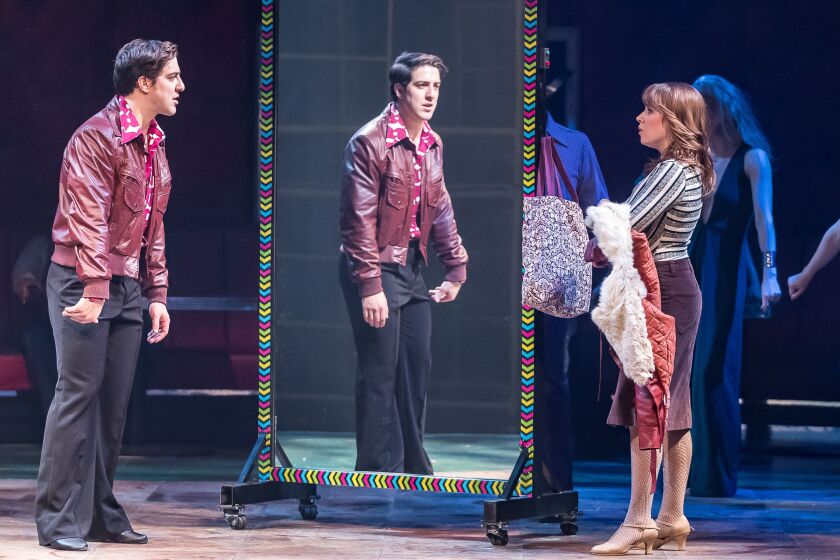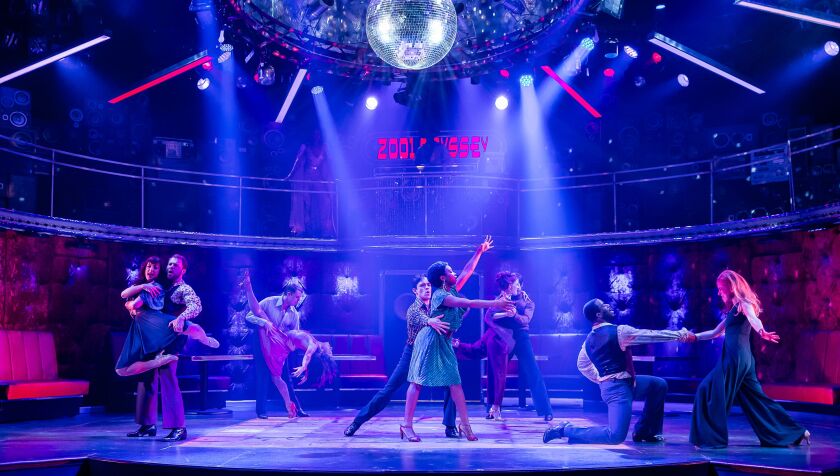If you happened to be on the planet in 1977, you will surely recall the sensation generated by a guy named John Travolta who burst onto the screen as Tony Manero in “Saturday Night Fever,” dressed in platform dancing shoes and slightly belled trousers, and walking with that insinuating gait dubbed the Brooklyn Hustle. Two decades after Elvis Presley had performed on the Ed Sullivan Show, Travolta re-energized the pelvic swivel for the disco generation, and he even lit a flame in Princess Diana, who memorably danced with him at a White House gala.
Now, 40 years later, Tony Manero, the 19-year-old working class Italian Catholic guy from Bay Ridge, Brooklyn who yearns for something bigger and better in life – and only feels alive when he is dancing up a storm in a local disco club – continues to hold a place in audiences’ hearts. For all his faults, and all his self-doubts – or more likely because of them – he still makes people root for him. That feeling certainly was palpable Thursday night as the dance-filled stage musical version of “Saturday Night Fever” opened at Drury Lane Theatre, with Adrian Aguilar, a performer whose work I’ve admired for years, bringing a winningly realistic twist to the iconic role, along with all the requisite superb dancing and playfully sexy, pelvis-swinging. Tony may feel “Stuck,” but watching as Aguilar nervously preens in front of a bedroom mirror is a fine reflection of his potential.
‘SATURDAY NIGHT FEVER’
Recommended
When: Through April 9
Where: Drury Lane Theatre,
100 Drury Lane, Oakbrook Terrace
Tickets: $45 – $60
Info: (630) 530-0111;
http://www.drurylanetheatre.com
Run time: 2 hours and
15 minutes with one intermission
Based on the film and original story by Nik Cohn, adapted by Robert Stigwood in collaboration with Bill Oaks, and reworked for its North American version by Sean Cercone and David Abbinanti (with a number of plot alterations and a somewhat jerky episodic quality), the Drury Lane production has been directed and choreographed by the New York-based Dan Knechtges, and features the usual sensational music direction of Roberta Duchak. And of course the show is propelled by the iconic hits of the Bee Gees (“Stayin’ Alive, ” “How Deep is Your Love,” “Night Fever, More Than a Woman,” “Jive Talkin’,” “You Should Be Dancing” ), and a slew of other songs, from “Night on Disco Mountain” to “Boogie Shoes.”
Nostalgia-proof it certainly is. And in a strange way the show’s story might connect with those millennials who saw their prospects diminished during the recent recession, and often had to live with their parents long after they wanted to declare independence. Set in the New York of the 1970s, when the city was down on its luck, the story also plays on a dark streak of racial discrimination (the entrenched Italians versus the Hispanic arrivals in the neighborhood), and a good suggestion of women’s lives on the very brink of the feminist movement.
Tony Manero still lives with his bickering parents, with Brett Tuomi playing his angry, laid off dad, and the terrific Marya Grandy as his church-going mother, who worships her oldest son, Frank, Jr. (beautifully played by Skylar Adams), because he became a priest. He works a boring job as a salesman in a paint and hardware store, and is still part of a post-high school pack of neighborhood guys (including the soulful, conflicted Bobby C, expertly played by Nick Cosgrove), several of whom have relationships with women though they’ve not yet fully emerged from adolescence.
The only time Tony really comes alive is on Saturday nights, when he heads to the 2001 Odyssey disco, where he is relentlessly pursued by the adoring, continually thwarted Annette (the winningly determined Landree Fleming brings down the house with “If I Can’t Have You”). And though he initially agrees to enter a big disco dancing contest with her, he soon becomes enthralled by Stephanie Mangano (Erica Stephan, a wonderfully lyrical dancer who also can sing up a storm as she does in “What Kind of Fool”). A fetching blonde, Stephanie is a skilled dancer. She also is full of laughable pretenses, and determined to keep Tony at a distance, even if she senses he is very much her alter ego. What sets her apart, however, is that she has made that quantum leap to a life in Manhattan.
To be sure, the Brooklyn disco where much of the action unfolds, is no Studio 54, and set designer Kevin Depinet has turned down the glamor, as has costume designer Rachel Laritz. (Less successful is Depinet’s clunky rendering of the elegant Verrazano-Narrows Bridge, relatively new at the time, where Tony goes to think and sometimes gets in trouble.) But the entertainment at the disco is top-notch, with Alex Newell as Candy, the soulful, gold-gowned singer, and Jhardon Dishon Milton as Monty, the wiry, Afro-crowned DJ who can work the crowd into a frenzy, and does so in “More Than a Woman.”As for Adrienne Storrs and Martin Ortiz Tapia, they stop the show with their knockout of a Latin dance number.
Joe Capstick, Will Lidke, Brandon Springman and Cosgrove bring their own distinctive dance styles to the floor as Tony’s friends, Allyson Graves is fervent as Bobby C’s unhappy girlfriend, and the large ensemble boogies it up in the big dance numbers. As for that disco beat, it just gets you every time.







